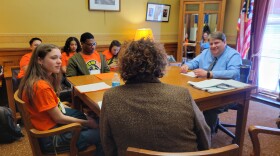The mission behind WUWM's election coverage is to equip Milwaukee-area residents to make decisions and effect change.
-
The State Democracy Initiative's Derek Clinger weighs in on President Trump's calls to 'nationalize' voting and legislative efforts to overhaul voting requirements.
-
The Wisconsin GOP-led Legislature wants to put a constitutional amendment before voters that would change the state government's approach to diversity, equity and inclusion.
-
With incumbent Gov. Tony Evers not running for reelection, it's a wide open field.
-
Wisconsin's minimum wage is currently at $7.25 per hour, the federal minimum. A coalition of labor and progressive groups are campaigning for a boost to $20 per hour.
-
A report claims that the 2024 Republican National Convention generated a $321 million economic impact for the Milwaukee-area economy. But this report does not account for losses of regular business.
-
Susan Crawford won the state supreme court race by nine percentage points. JR Ross chimes in on what it all means and what to keep an eye on from Wisconsin's high court.
-
Tuesday, Wisconsin voters overwhelmingly elevated the state's photo ID requirement from state law to constitutional amendment under a proposal approved by voters.
-
How did voters decide on school referenda in the Racine Unified School District and Wauwatosa? Here's what to know.
-
Wisconsin voters chose our next State Superintendent of Public Instruction Tuesday. Here's what to know.
-
The Democratic-backed candidate for Wisconsin Supreme Court has won, defeating President Donald Trump’s endorsed challenger. Susan Crawford’s victory Tuesday cements a liberal majority for at least more three years.










